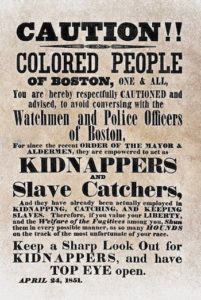
Slave Law Poster
*The Fugitive Slave Act or Fugitive Slave Law was passed by the United States Congress on this date in 1850.
This was part of the Compromise of 1850 between Southern slave-holding interests and Northern Free-Soilers. The law was one of the most controversial elements of the 1850 compromise and heightened Northern fears of a "slave power conspiracy." It required that all escaped slaves, upon capture, be returned to their masters and that officials and citizens of free states had to cooperate. Abolitionists nicknamed it the "Bloodhound Law" for the dogs that tracked down runaway slaves.
Due to northern resentments, the acts of 1793 and 1850 faced legal challenges, primarily in disputes over state personal liberty laws. In Prigg v. Pennsylvania (1842), the U. S. Supreme Court ruled against a Pennsylvania citizenship statute and upheld the first fugitive slave law's constitutionality. Nevertheless, some states continued to pass laws strengthening the applicability of habeas corpus writs and prohibiting state officials from accepting jurisdiction under federal law.
In Ohio, the chief objective was less a desire to expand Black rights than to ensure that outright kidnapping was not condoned. (Ohio did not repeal its virulently discriminatory Black Code until 1849.) Southerners objected strenuously to personal liberty laws as a violation of sectional equity and reciprocal trust. Still, the 1850 act, seen in the North as punitive and tyrannical, only aroused greater sectional animosities.
Northern opposition was most dramatically illustrated when an abolitionist Boston mob tried to rescue Anthony Burns, a fugitive from Virginia, in May 1854. The mission failed. Commissioner Edward Loring had Burns returned to slavery, and U. S. troops escorted him through sullen crowds to a waiting ship. The effort cost the federal government more than $100,000.